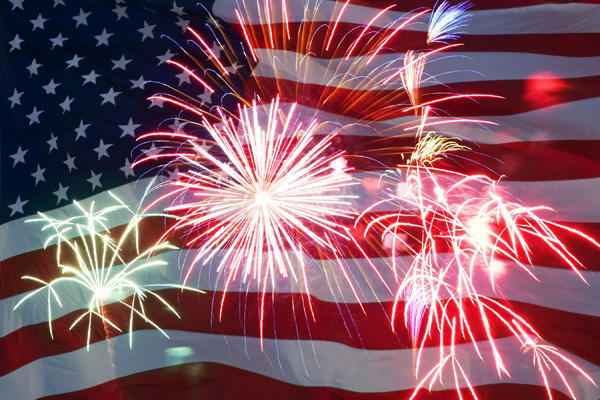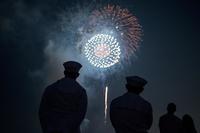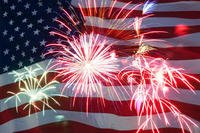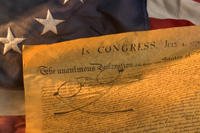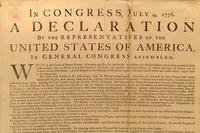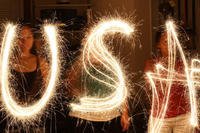The American traditions of parades, cookouts, and fireworks help us celebrate the summer season, especially our nation's birthday on the Fourth of July. However, fireworks can turn a joyful celebration into a painful memory when children and adults are injured or killed while using fireworks. Although legal consumer fireworks that comply with U.S. Consumer Product Safety Commission (CPSC) regulations can be relatively safe when used responsibly, all fireworks by their nature are hazardous and can cause injuries.
Fireworks are classified as hazardous substances under the Federal Hazardous Substances Act (FHSA). Some fireworks, such as illegal firecracker-type devices (M-80s, quarter sticks) and professional display fireworks should never be used or handled by consumers, due to the risk of serious injury and death.
Following are just a few examples of recent injuries caused by legal and illegal fireworks:
- A 19-year-old man held an aerial shell in his hand and lit it. The firework went off before he thought it would, causing him to lose his right pinky finger down to the first knuckle and the tips of the rest of his fingers.
- A 41-year-old male was decapitated when he ignited what is being reported as an illegal or homemade firework. The device exploded prematurely.
- A 47-year-old male and his brother-in-law lit a professional-grade firework. When the device did not ignite as expected, the victim looked into the tube, and the device detonated, causing fatal trauma to the victim's head and face.
To help prevent incidents like these, the federal government, under the FHSA, prohibits the sale of the most dangerous types of fireworks to consumers.
These banned fireworks include:
- Large reloadable mortar shells
- Cherry bombs
- Aerial bombs
- M-80 salutes
- Larger firecrackers containing more than two grains of powder
- Mail-order kits designed to build larger fireworks
In a regulation that went into effect on Dec. 6, 1976, the CPSC lowered the permissible charge in firecrackers to no more than 50 milligrams of powder. In addition, CPSC regulations provide performance requirements for fireworks other than firecrackers intended for consumer use, including a requirement that fuses burn at least 3 seconds, but no longer than 9 seconds. All fireworks must carry a warning label describing necessary safety precautions and instructions for safe use.
CPSC estimates that in 2014, about 10,500 people were treated in hospital emergency rooms for injuries associated with fireworks. More than half of the injuries were burns, and most of the injuries involved the head (including face, eyes, and ears), hands, fingers, and legs. Children under the age of 15 years old accounted for more than 35 percent of the estimated injuries. Fireworks should be used only with extreme caution. Older children should be closely supervised, and younger children should not be allowed to play with fireworks, including sparklers.
Before using fireworks, make sure they are permitted in your state or local area. Many states and local governments prohibit or limit consumer fireworks, formerly known as "class C fireworks," which are common fireworks, and firecrackers sold for consumer use. Consumer fireworks include: shells and mortars, multiple tube devices, Roman Candles, rockets, sparklers, firecrackers with no more than 50 milligrams of powder, and novelty items, such as snakes, airplanes, ground spinners, helicopters, fountains, and party poppers.
To help consumers use fireworks more safely, the CPSC offers these recommendations:
- Do not allow young children to play with fireworks under any circumstances. Sparklers, often considered by many to be the ideal "safe" firework for the young, burn at very high temperatures and can easily ignite clothing. Children cannot understand the danger involved with fireworks and may not act appropriately while using the devices or in case of emergency.
- Older children should be permitted to use fireworks only under close adult supervision. Do not allow any running or horseplay.
- Set off fireworks outdoors in a clear area, away from houses, dry leaves, or grass and other flammable materials.
- Keep a bucket of water nearby for emergencies and for pouring on fireworks that fail to ignite or explode.
- Do not try to relight or handle malfunctioning fireworks. Soak them with water and throw them away.
- Be sure other people are out of range before lighting fireworks.
- Never light fireworks in a container, especially a glass or metal container.
- Keep unused fireworks away from firing areas.
- Store fireworks in a cool, dry place.
- Check instructions for special storage directions.
- Observe local laws.
- Never have any portion of your body directly over a firework while lighting.
- Do not experiment with homemade fireworks.
MAIL-ORDER "MAKE- YOUR-OWN" FIREWORKS KITS AND COMPONENTS— DESIGNED TO BUILD BANNED FIREWORKS—ARE PROHIBITED BY LAW.
Following is a summary of state regulations as of June 1, 2015:
I. STATES THAT ALLOW SOME OR ALL TYPES OF CONSUMER FIREWORKS (formerly known as class C fireworks), APPROVED BY ENFORCING AUTHORITY, OR AS SPECIFIED IN LAW (43 states, District of Columbia and Puerto Rico):
Alabama Nebraska Alaska New Hampshire Arizona New Mexico Arkansas New York California Nevada Colorado North Carolina Connecticut North Dakota Florida Oklahoma Georgia Oregon Hawaii Pennsylvania Idaho Rhode Island Indiana South Carolina Kansas South Dakota Kentucky Tennessee Louisiana Texas Maine Utah Maryland Virginia Michigan Washington Minnesota West Virginia Mississippi Wisconsin Missouri Wyoming Montana (The District of Columbia and Puerto Rico, in addition to the above states, enforce the federal regulations and applicable state restrictions.)
II. STATES THAT ALLOW ONLY SPARKLERS AND/OR OTHER NOVELTIES (Total of 4 states):
- Illinois
- Ohio
- Iowa
- Vermont
IV. STATES THAT BAN ALL CONSUMER FIREWORKS (including those that are allowed by CPSC regulations) (Total of 3 states):
- Delaware
- Massachusetts
- New Jersey
To report a dangerous product or a product-related injury, log on to: www.saferproducts.gov or call CPSC's hotline at (800) 638-2772, or CPSC's teletypewriter at (800) 638-8270. Consumers can report product hazards to info@cpsc.gov. Consumers can obtain press releases and recall information at CPSC's website at: www.cpsc.gov..
